Hanover Insurance Leads Specialty Growth with Tech-Driven Strategy in P&C Market
The Hanover Insurance Group (THG) stands out in the U.S. property and casualty insurance sector, focusing on small-to-midsize clients within a $78 billion addressable market and a market cap of $6.3 billion.
THG has demonstrated superior market performance in the first half of 2025, outperforming its industry peers with a 9.8% gain against the industry's 7.2%. This growth reflects strategic positioning in the independent agency channel and a balanced portfolio with a growing specialty business segment.
THG has maintained a strong earnings trajectory, surpassing analyst estimates in the last four quarters with an average earnings surprise of nearly 30%. While its five-year earnings growth rate of 10.4% trails the broader industry average of 20.9%, the firm is focusing on targeted expansion, prudent pricing strategies, and selective geographic and product diversification to sustain growth.
Strategic initiatives include leveraging data analytics and technology to enhance underwriting discipline and reduce exposure in catastrophe-prone regions, particularly focusing on coastal risk management. The company aims for about 10% compound annual growth in Specialty written premiums over the next five years, with projected net written premium growth of 6% to 7% for the remainder of 2025. Investment in generative AI and automation is expected to improve front-end operations and claims processing efficiency, targeting a reduction in loss adjustment expenses.
Despite these advantages, there are inherent challenges such as underwriting volatility driven by increasing natural catastrophe frequency and severity, alongside a low interest rate environment that limits investment income. THG's ongoing commitment to dividend growth over two decades has resulted in a commendable 2.2% yield, outperforming the industry average and appealing to income-focused investors.
The competitive landscape includes notable property and casualty insurers like The Progressive Corporation, Heritage Insurance Holdings, Inc., and Mercury General Corporation. Progressive continues to capitalize on its auto insurance dominance with diversified product offerings and a strategic focus on bundled policies. Heritage Insurance emphasizes profitability through disciplined underwriting and selective market engagement, while Mercury General advances premium growth primarily through rate increases and an expanded policy base in California.
Collectively, these market movements underscore critical trends such as enhanced pricing discipline, technology adoption, and geographic and product diversification within the U.S. property and casualty insurance space. These factors will influence insurer competitiveness and risk management approaches in the evolving regulatory and market environment.


